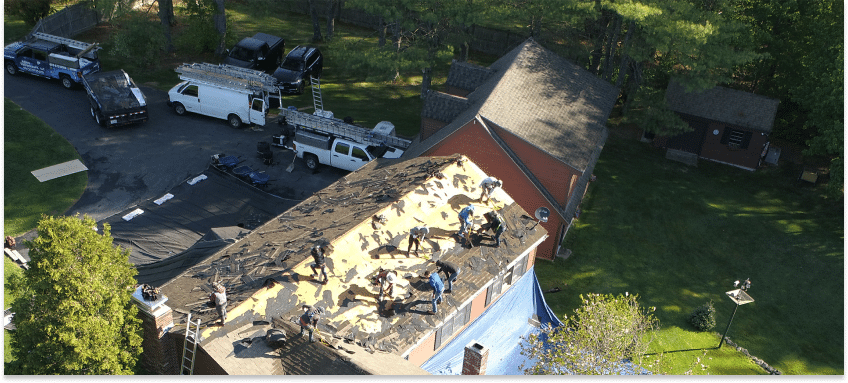The roofing industry has witnessed a significant transformation due to advancements in technology and an increasing demand for transparency and professionalism. One crucial aspect of this transformation is the way contractors provide a roofing scope of work within their contracts.
A well-defined scope of work is essential for both contractors and homeowners. In fact, it sets clear expectations and helps prevent disputes down the road. In this article, we’ll dive into the importance of providing a comprehensive scope of work in roofing contracts.
We’ll show how CRM software can streamline this process. We’ll also explore how software can manage every step of each project once the contract is signed.

The Significance of Roofing Scope of Work
The scope of work serves as a cornerstone for a successful roofing project. It’s a written documentation that outlines the specific tasks, responsibilities, materials, and timelines associated with each project.
This document ensures that all parties involved, including the contractor and the homeowner, have a clear understanding of what the project entails. Overall, this reduces the likelihood of misunderstandings and disputes. Specifically, here’s why it’s so important:
- Clarity and Transparency: A detailed scope of work provides complete transparency. Homeowners can see precisely what they are paying for. This instills trust and confidence in the contractor. Moreover, it helps eliminate any ambiguity in project expectations.
- Risk Mitigation: By specifying the scope of work, contractors can mitigate potential risks. It sets boundaries for the project and reduces the potential for financial and scheduling issues.
- Legal Protection: Should any disputes arise, a comprehensive scope of work can serve as a legal document to resolve conflicts. It clearly defines the project’s terms, making it easier to determine whether parties are adhering to the agreed-upon terms.
- Efficiency: A well-defined scope of work streamlines project execution. Roofing contractors can allocate resources, manpower, and materials more efficiently when they have a plan in place.
- Customer Satisfaction: Satisfied customers often lead to repeat business and referrals. When customers know exactly what to expect and see their expectations met, they are more likely to have a positive experience and recommend the contractor to others.
A roofing scope of work is necessary during the sales process. However, it also provides the foundation for your team as the real work begins.

The Role of Software in Roofing Scope of Work
Managing scope of work details manually can be a time-consuming and error-prone task. Therefore, this is where software can come into play. Roofing software is designed to streamline the creation and management of contracts, project tracking, and communication with customers. Furthermore, here’s how software can help roofing contractors provide more professional contracts and scope of work details:
1. Contract Templates
Sales software, such as Leap’s SalesPro, enables roofing contractors to create standardized contract templates with predefined sections for scope of work. These templates can be customized to fit the unique needs of each project.
In addition, they provide a consistent structure for all contracts. This not only saves time but also ensures that important details are not overlooked.
2. Customization
Each roofing project is unique, and software allows contractors to tailor the scope of work to specific customer requirements. Whether it’s specifying the type of roofing materials, project timelines, or additional services, the software enables easy customization of the scope of work to match the customer’s needs.
3. Digital Signatures
Many software solutions offer electronic signature capabilities. This feature simplifies the contract signing process by allowing customers to sign contracts digitally.
This not only speeds up the contract execution but also enhances security and document storage. Digital contracts provide homeowners with a more professional sales experience that saves everyone time.
4. Document Management
CRM software, such as the Leap platform, provides a central repository for all project-related documents. And in general, this includes contracts and roofing scope of work.
It makes it easy to access, share, and update these documents as the project progresses. Moreover, it reduces the risk of misplacing or losing critical project information.
5. Version Control
Scope of work details can change over the course of a project. Roofing CRM software with version control features allows contractors to track and manage changes.
This ensures that all parties are aware of any modifications. It also prevents any miscommunication during the project timeline. Overall, version control is particularly important from one project to the next.
6. Communication
Effective communication with customers is essential to success. CRM software often includes email integration and communication tracking.
Contractors can use the software to keep customers informed about project progress, changes to the scope of work, and any issues that may arise. Communication features include automated emails and texts along with a history of your interactions.
7. Project Management
The roofing scope of work provides the main details for each project. However, now the real work begins as during the installation.
CRM software can serve as a project management tool, helping roofing contractors oversee every aspect of their projects. This includes scheduling, resource allocation, progress tracking, and budget management. The scope of work serves as the foundation for project planning, and CRM software ensures it’s seamlessly integrated into the project management process.
8. Progress Tracking
With CRM software, contractors can monitor project progress in real-time. This includes tracking the completion of tasks outlined in the scope of work.
You can also assess timelines and identify potential bottlenecks. Contractors can take proactive measures to keep the project on track from start to finish.
Discover the Leap Platform and SalesPro
In the roofing industry, professionalism and transparency are paramount for building trust with customers and ensuring successful projects. The roofing scope of work is the linchpin that ties together these key elements. A well-defined scope of work not only sets clear expectations but also serves as a legal document to protect all parties.
By harnessing the power of SalesPro, roofing contractors can significantly enhance their ability to provide professional scope of work details through digital contracts. And better yet, SalesPro gives your team the ability to create customizable contract templates that can seamlessly transfer to the Leap platform after completing a deal.
The Leap platform offers a comprehensive end-to-end management solution. From the initial contract to project management and beyond, it provides the tools necessary to keep projects on track, manage resources efficiently, and ensure customer satisfaction.
You can save time, reduce common errors, and enhance communication and transparency. Automate repetitive tasks and eliminate the inefficiencies that are holding your business back.
As the roofing industry continues to evolve, embracing technology empowers roofing contractors to deliver a high quality of work and an exceptional customer experience. It is the bridge that connects the roofing scope of work with successful project execution, customer satisfaction, and long-term business growth.
To learn more about the Leap platform and SalesPro, fill out the form below and schedule a quick demo. From the neighborhood contractor to the national franchise, Leap provides the software solutions that can reinvent your sales process and maximize your operations.




